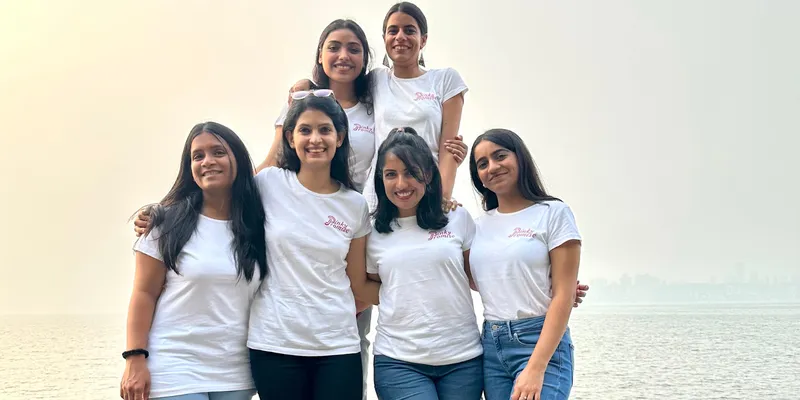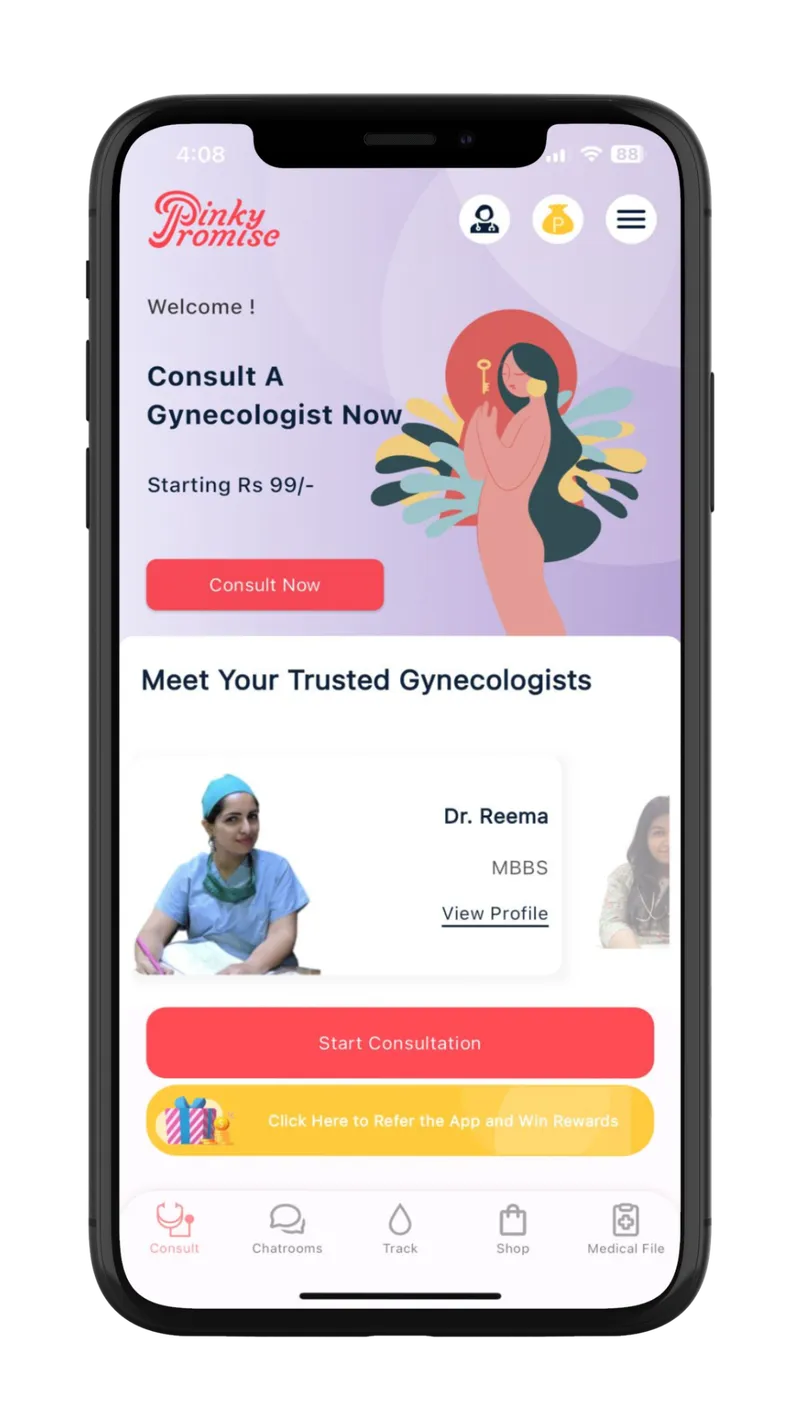[100 Emerging Women Leaders] Divya Balaji Kamerkar's Pinky Promise is leveraging AI/ML to transform women’s healthcare
Available as a website and as an application, Pinky Promise, founded by Divya Balaji Kamerkar, leverages advanced AI/ML technology, specifically trained on women's health data, to provide rapid, accurate, and judgement-free healthcare.
Divya Balaji Kamerkar was pregnant with her first child and was also pursuing an MBA at Wharton School when the Covid-19 pandemic hit the world. She decided to return to India to deliver her baby.
“After arriving, I started experiencing some symptoms and had to consult a gynaecologist online as going in person was out of the question. It took me two weeks and multiple consults to get a diagnosis, and when I had one, I realised that we could have gotten one in the first week itself if the doctor I was consulting had been assisted with the right medical history about me and the right data,” Kamerkar recalls.

The Pinky Promise team
This experience made her understand a critical gap in India's healthcare landscape. While there are many health companies focused on community building and improving the generally broken care that women experience while solving their sexual and reproductive health issues, she realised that none of them were looking at women’s health as a space where deeptech and AI can play a crucial role in improving both quality and outcomes.
“This led us to build as a first-of-its-kind AI/ML-based clinic dedicated to women’s sexual and reproductive health in India, aiming to provide comprehensive and accurate medical support tailored specifically for women,” she says.
Diverse experiences

The app
Kamerkar's life has been one of myriad experiences. After completing a degree in Ecology from Yale University, she moved to Tanzania to work on mainstreaming women’s access to HIV care.
After this, she moved back to India to work in Bihar on a project to improve malnutrition rates in the region.
Kamerkar also worked for the Delhi Commission for Women to reduce crimes against women in Delhi.
“The Nirbhaya incident took place just a few minutes away from my home. I participated in the ensuing protests and helped the Justice Verma Commission seek consultation from women in Delhi and draft its suggestions,” she adds.
So, while her classmates from Yale were in high-flying jobs, she was taking a bus to work and was earning Rs 30,000 salary per month.
Her only close-to-conventional job was when she started working in social impact consulting for the Bridgespan Group, where she learnt a lot about the healthcare sector in India.
Digital-first care platform for women
When the idea of Pinky Promise took root, Kamerkar studied the market in depth, speaking to thousands of women across the country. In 2022, the team polled more than 300 women to understand what they did when they experienced a gynaecological issue.
The results were an eye-opening experience.
“We learnt that more than 70% avoided going to a gynaecologist despite knowing they needed to go. We also learnt that over 73% first looked online for their symptoms, preferring the privacy and anonymity of online searches over even talking to friends about their issues. This convinced us that a digital-first care platform for women made sense to build,” she explains.
“We realised that women were more truthful about their symptoms to a chatbot versus even to a friendly human,” she adds.
So, before building the app, they built out triaging systems to screen for various common reproductive health issues on a simple Excel sheet and then mimicked a chatbot (with due consent) on WhatsApp and Facebook, asking women these questions. The women would also get a call. They found that women were more honest while chatting compared to discussing on a call, and thus trusted a chat-based diagnosis.
Pinky Promise is built on a focussed strategy–to leverage advanced AI/ML technology, specifically trained on women's health data, to provide rapid, accurate, and judgement-free healthcare.
This is how it works.
Once you are on the app, you can immediately connect to a gynaecologist in real-time. Simultaneously, the chatbot asks you a series of questions, which are viewed by the doctor on their app.
The questions are also customised based on previous responses. The doctor is able to intervene at any time, and ask additional questions to the patient. The chatbot has been custom-trained on over 250 top medical protocols collated and vetted by medical experts and is updated constantly based on the data received. The bot also prescribes medication based on the questions and answers, which is then reviewed by the doctor before sharing it with the patient.
On the app, a woman can instantly consult for 97% of all reproductive healthcare issues (350+ symptoms) and manage her longer-term chronic issues. The platform offers instant chat consultations for Rs 99, voice consultations for Rs 199, and Care Programs from Rs 99-2,400.
For two years, she built Pinky Promise out of her home, and in 2023, Akanksha Vyas, her husband’s friend, joined her. Vyas has 12 years of experience in building AI products with a focus on healthtech.
Pinky Promise’s target audience is women between the ages of 18-34 in Tier I and Tier II cities.
“Geographically, approximately 70% of our customers come from Tier 2 and smaller parts of India, and upwards of 60% have never been to a gynaecologist before and are consulting one for the first time on Pinky Promise,” says Kamerkar.
Impressive growth
Pinky Promise has about 80,000+ app downloads and has served more than 10,000 paying customers.
“We have an 84% cure rate and a 91% prescription adherence rate, which is 3x higher than the industry average—all while maintaining a customer acquisition cost of Rs 20,” she adds.
The startup’s initial growth has been largely self-funded and later through grants and awards.
“The Mulago Foundation has awarded us $100,000, USAID has awarded us another $100,000 for our work, and finally, we have a handful of angels, including friends and family, who have believed and supported us,” Kamerkar says.
Having spent the past year building and ensuring the scalability of its technology pan-India, Kamerkar says the plan for the next 12 months is to scale digital presence considerably and make sure that Pinky Promise is the number one women’s health brand in the minds of Indian women.
In terms of revenue, they it plans to achieve milestones of Rs 1.5 crore by the end of the fiscal, and Rs 8 crore or more by the end of 2025. and It also plans on expanding chronic care offerings.
“Surround yourself with people who motivate and challenge you. Find women who can mentor you and connect you to others who can help your business. And above all, keep learning,” she advises.
Edited by Megha Reddy


![[100 Emerging Women Leaders] Divya Balaji Kamerkar's Pinky Promise is leveraging AI/ML to transform women’s healthcare](https://images.yourstory.com/cs/4/8e7cc4102d6c11e9aa979329348d4c3e/100EmergingWomenLeadersV2DivyaBalajiKamekarFeatureImage-1719464807477.jpeg?mode=crop&crop=faces&ar=16%3A9&format=auto&w=1920&q=75)




